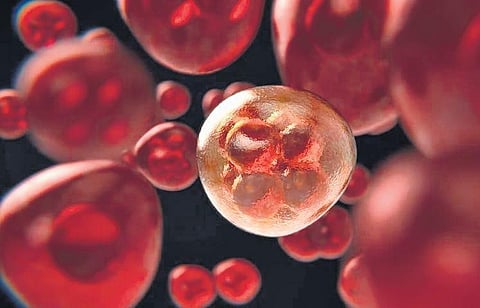

NEW DELHI: The Covid-19 pandemic had a major impact on childhood cancer detection and diagnosis. Many poor parents abandoned the treatment due to a shortage of blood products and chemotherapy agents and in some cases, because of the complete closure of paediatric cancer care service, said a recent ICMR-NCDIR report.
Childhood cancer care services were affected in most tertiary and secondary hospitals - as most of them turned into Covid hospitals - leading to a decrease in detecting new cases, interruptions in radiotherapy, and reduced surgeries, said the report.
The report by the National Centre for Disease Informatics and Research (NCDIR) under the Indian Council of Medical Research (ICMR), Bengaluru, in collaboration with the World Health Organisation (WHO)-India said that it was not only government hospitals which were impacted during the pandemic, services at NGOs and charitable hospitals providing paediatric cancer care were also affected badly.
Private hospitals, said the report, managed to continue their cancer services, despite bearing the Covid-patient load. But, some of them, too, reported treatment abandonment and decreased in new paediatric cancer diagnoses.
According to Dr Prashant Mathur, Director, NCDIR, government hospitals saw a decrease in new paediatric cancer diagnoses, an increase in treatment abandonment, reduced surgical care, a dip in evaluation of new cases of suspected cancers and in some cases some they completely closed their paediatric cancer care services during the pandemic.
He, however, told this paper that one positive outcome was that during this time, there was an increase in telemedicine use, and many oncologists came out with modifications in chemotherapy regimes.
Dr Manas Kalra, a pediatric oncologist at Sir Ganga Ram Hospital, said "COVID 19 created havoc and children with cancer were not spared the impact. The biggest challenge was the fear of the unknown. We didn't know whether Covid infection would make the already immunocompromised host worse and interfere with their treatment."
He said the second Covid-19 was tough for cancer treatment, as it did lead to significant morbidity especially in children with blood cancer.
"Pneumonia, Aspergillosis (white fungus), mucor (black fungus), candida and TB were some of the other challenges that complicated the course of children with Covid-19 infection,"he told TNIE.
According to Dr Aakaar Kapoor, Medical Advisor and Chief Radiologist at City Xray & Scan Clinic Pvt. Ltd, the struggle was more evident during the first Covid wave than in the second and third waves.
Data suggests that the Covid-19 pandemic resulted in considerable barriers to cancer detection and care in children because diagnosis and therapy of childhood cancers require access to care in the form of travel to a referral centre, financial resources, medical teams, blood donors, and require health care workers to work as a team to deliver optimal therapy to every single child, he said.
On International Childhood Cancer Day, experts said that the need of the hour is to create massive awareness among the public and also general physicians and primary care providers about childhood cancer symptoms and signs so that it is detected on time.
Four per cent of all cancer cases in India are detected in children. Still, in the absence of any separate childhood cancer policy, these children are not detected on time due to a lack of trained doctors and nurses or reach facilities late, and sometimes, die even before they are diagnosed.
Even though childhood cancer is curable if detected early, many parents leave the treatment of their child midway due to high cost, regular long-term follow-ups, lack of referral hospitals, equipment and medicines or, in many cases, find it difficult to manage due to lack of social support, the ICMR report said.
"The number of childhood cancers diagnosed and treated represents the tip of the iceberg. Many patients may not be reaching the appropriate facility in time, or would have refused to initiate, or continue treatment, are lost to follow-up after diagnosis, and could have died before a definitive diagnosis was made," said Dr Mathur.